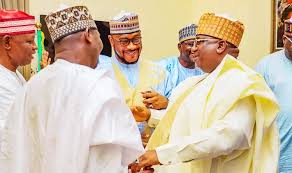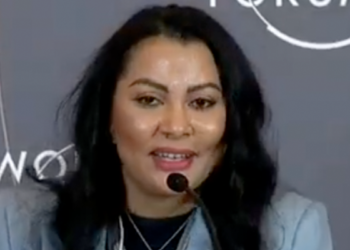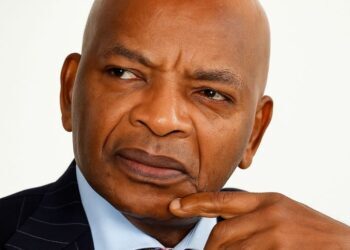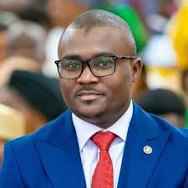A joint meeting of the Northern Governors Forum and Northern Traditional Rulers Council is currently ongoing in Kaduna aiming to tackle the region’s pressing security and developmental challenges.
In attendance at the meeting which was held at the Sir Kashim Ibrahim Government House, in the state capital on Monday, were Nigeria’s Chief of Defence Staff, General Christopher Musa.
While welcoming his colleagues, the Chairman of the Northern States Governors’ Forum, Muhammadu Yahaya, called for collective action to tackle challenges bedevilling the region.
The region is grappling with insecurity, economic hardship, environmental degradation, and youth restiveness.
Yahaya emphasized the need for collective action, stating, “Our collective resolve is being tested by the ongoing challenges that we face. However, our unity and commitment to the prosperity of the people remain our greatest source of strength that will enable us to overcome those challenges.”
The governor also acknowledged these challenges, saying, “Terrorism, banditry, kidnap-for-ransom, farmer-herder clashes, drug abuse, the menace of Almajiri and out-of-school children, poverty, and unemployment. We must continue to work with the Federal Government and relevant agencies to provide the necessary support and relief to those affected.”
To address these challenges, the governors proposed various solutions including “sustaining gains against criminals, studying and implementing the Coalition of Northern Group’s Security Committee report, and engaging with security agencies and civil society groups.
“Investing in education, skills development, and job creation; supporting small and medium enterprises; and attracting investment to northern states; as well providing support to farmers, ensuring rural security, and promoting agro-allied industries.
“Partnering with the Federal Government and stakeholders to build irrigation infrastructure and promote sustainable practices.”
Governor Yahaya also stressed the importance of cooperation, saying, “We must deepen our cooperation in areas such as infrastructure, education, and trade, working together to harness our region’s immense potential.”
He also emphasised the need for comprehensive reforms across all institutions.
“Let us not lose sight of the bigger picture – our shared responsibility to chart the way forward for a prosperous and forward-looking Northern Nigeria.
“The people of Northern Nigeria are counting on us to steer them through these challenging times, and with unity, determination, and bold actions, I am confident that we can fulfil our mandate to bring about a brighter, more prosperous future for all our people”, Yahaya said.
Earlier in his remarks, Kaduna Governor and chief host, Senator Uba Sani, while welcoming his colleagues and traditional rulers in the region as well as the Chief of Defence, General Christopher Musa, emphasised unity and collective action against regional challenges.
Sani, also acknowledged the northern Governors’ commitment to peaceful coexistence and shared prosperity, urging that “We must work together to realize our vision of a secure, peaceful, and prosperous North.”
The Governor commended President Bola Tinubu’s efforts to combat insecurity, citing the establishment of a Joint Military Command and Operation Fansan Yamma as clear demonstrations of the Federal Government’s commitment.
He also highlighted the importance of unity and cooperation among northern leaders while praising the Chief of Defence Staff, General Christopher Musa, for his presence and support.
Under the leadership of Governor Muhammad Inuwa Yahaya and Sultan of Sokoto, Muhammad Sa’ad Abubakar, the forums aim to address regional challenges, he said.
Sani expressed confidence in their ability to make a positive impact, stating, “I am confident that under the able leadership of H.E. Muhammad Inuwa Yahaya and His Eminence, the Sultan of Sokoto, Muhammad Sa’ad Abubakar, CFR, the Northern Governors Forum and the Northern Traditional Rulers Council will make their marks as effective platforms for addressing the security and developmental challenges confronting the North.
“Let me use this opportunity to commend our dear President, Bola Ahmed Tinubu, GCFR for reinvigorating the war against terrorists, bandits, kidnappers and other criminal elements in the North. The establishment of a Joint Military Command and launching of Operation Fansan Yamma are clear demonstrations of the Federal Government’s commitment to decisively tackle the multidimensional challenges of insecurity confronting the North.”
Sultan of Sokoto and Chairman of Northern Traditional Rulers Council, Alhaji Sa’ad Abubakar stressed traditional rulers’ role in promoting peace and stability, saying, “We must work together to ensure our region’s progress.”
Among the regional governors who attended the meeting were Bauchi Governor, Bala Mohammed, Borno’s Prof. Babagana Zulum, Nasarawa’s Abdullahi Sule, governor Ahmadu Fintiri of Adamawa State, Gombe governor, Mohammed Yahaya, Governor Uba Sani of Kaduna.











